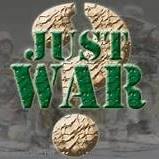Here are just a couple scattered thoughts that have come swirling into my mind in the wake of Osama bin Laden’s death:
First, should we consider it anything more than a blind coincidence that this momentous attack was carried out on Divine Mercy Sunday? (And coincidentally the same Divine Mercy Sunday set aside for the beatification of the late Pope John Paul II, who designated the Easter Octave as a universal commemoration of divine mercy?)
Second, is it appropriate to feel at least feel a little uncomfortable with the primary meaning which our President (and the media) has attached to this momentous attack, which was set in motion on Divine Mercy Sunday, namely that “Justice has been done” ?
True: mercy and justice have always been inseparably linked in the Judeo-Christian tradition. (“Love and truth shall meet; justice and peace shall kiss,” as Psalm 85 famously puts it.) But is there any way of intelligibly linking the justice done to Osama Bin Laden with the divine mercy proclaimed by Jesus to St. Faustina, and through her to the whole world? Yes, justice has been done; but whose justice, exactly?
Is the justice that was done to this terrorist the sort of justice that Christians should recognize and celebrate? Should Christians consider the eradication of this murderer as an act of divine mercy? If so, how do we fit together his execution with the execution of our Lord? Can we reasonably and in good conscience associate the bullet-hole in bin Laden’s head with the hole in Jesus’ pierced side, from which divine justice and mercy poured out upon the whole human race? I am thankfully not alone in the blogosphere in seeing some incongruity here.
Thirdly, is it appropriate for Christians to feel a little uneasy with the outpouting of “solidarity” among the American citizenry in the wake of bin Laden’s death? The American public is jubilant today: what are we to make of this jubilation? Should we join in it, waving our flags and honking our horns? Is such jubilation compatible with the jubilatio which we as Christians render to the risen Lord? Is it compatible with the Jubilate Deo of Psalm 100?
Now that we have put Christ to death, should we be content to celebrate the execution of Barabbas as well? Or Judas? Or Herod? Or Pilate? Or Caiaphas? Where does the list of justicable enemies end? Doesn’t Christ’s own death somehow speak to the demands of justice in a way that renders the death of the unjust unnecessary, or even blasphemous? Yes, the blood of the slain does cry out from the ground; but does it not find its answer in the blood that pours from Christ’s side?
We should be wary of the solidarity produced by the jubilation we see around us today. President Obama told us last night that we, as a country, “will never tolerate our security being threatened, nor stand idly by when our people have been killed. We will be relentless in defense of our citizens and our friends and allies. We will be true to the values that make us who we are.”
What are these values, though? And how is bin Laden’s death an expression of them? Does mercy happen to be one of those values? Perhaps our sensitivity to bin Laden’s cultural and religious background might be an expression of mercy, insofar as we buried him according to Islamic custom. Perhaps this gesture of respect for the body of our enemy constitutes mercy. Burying the dead is a corporal work of mercy, after all. Yet can we really see in this act the legacy of Joseph of Arimathea and the myrrh-bearing women?
Fourthly and finally, should we be comfortable with the utter absence of any public expression (or even the possibility of any public expression) of forgiveness for the crimes that were committed against our citizens? Shouldn’t this bother us as Christians? Surely part of Augustine’s claim that killing another person can in fact be an act of charity is the supposition that one can and should forgive the enemy which one must, regretably, kill. Is there any way we as a nation could ever incorporate an expression of forgiveness into such acts of “justice” as those ordered and carried out on this Divine Mercy Sunday?
The late pope beatified that same day wrote these words about the social virtue of solidarity:
In the light of faith, solidarity seeks to go beyond itself, to take on the specifically Christian dimension of total gratuity, forgiveness and reconciliation. One’s neighbor is then not only a human being with his or her own rights and a fundamental equality with everyone else, but becomes the living image of God the Father, redeemed by the blood of Jesus Christ and placed under the permanent action of the Holy Spirit. One’s neighbor must therefore be loved, even if an enemy, with the same love with which the Lord loves him or her; and for that person’s sake one must be ready for sacrifice, even the ultimate one: to lay down one’s life for the brethren (cf. 1 Jn 3:16).
I find these words rather at odds with the “justice” accomplished by our country on Divine Mercy Sunday. These words carry all the more weight for me in that they came from a man who knew what it felt like to take an assasin’s bullet. Like Christ, John Paul II embraced and forgave the enemy who saught to take his life. Like Christ, he commended his enemy to the mercy of God, and not to the “legions of angels” nor to the Navy SEALs. Perhaps that is why the Church decided to proclaim him “blessed” and to hold him up as a model of holiness on this Divine Mercy Sunday.
Osama bin Laden was a murderer and a criminal; there is little doubt of that. Part of me wanted him dead as much as anyone, and part of me still yearns to celebrate his death with the rest of my countrypeople. Yet I find it very difficult to reconcile the manner of his death with the justice and mercy of our Lord. While I find it very tempting to look at his execution and call it “justice,” the execution of Jesus Christ prevents me drom doing so.





Patrick – Thanks for your post…I’m so glad that a number of us are weighing in this morning.
Have you seen Hauerwas’s Pacifists Response to September 11th? The rush to celebration and such is highlighting for me the tension between national identity and religious identity. Loyalty to the United States versus Loyalty to Christ – which right now feel in conflict if the American response is jubilation…..It feels a lot like Hauerwas’ reflection on being separated/alienated from the “American we” and the uncomfortablility (yet, necessity of that) for American Christians.
Patrick-I too thank you for this helpful post. Much of what you write here I have thought about in connection with the issue of the death penalty (which is no longer seen as a “punishment” for the sake of justice, but is permitted in “rare if not practically nonexistent” cases for the safety of society against someone who poses a grave and imment threat). If I were to justify the killing of bin Laden, it would be along that line of argument.
Meghan, I too remembered this morning a lot of the initial comments many of us shared, including Hauerwas, back in the more immediate wake of 9/11.
Keep up the good work, people.
Thanks for these thoughtful comments, Patrick. I generally feel aversion to the jubilation of any large crowd (unless it is the World Cup) so that was less of a concern for me. But I think it is especially important now that we as Christians interrogate the event of Bin Laden’s death and whether or not it measures up to the standards of “American Justice.” Killing an unarmed man, if the reports are true, is a grave violation of a moral principle (i.e. proportionality) within military conduct and the just war tradition. That the Commander-in-Chief took full responsibility in ordering this operation with a certain level of pride is pause for some irony at the power of realpolitik. After all, he did say the following during his acceptance speech of the Nobel Peace Prize:
“Where force is necessary, we have a moral and strategic interest in binding ourselves to certain rules of conduct. And even as we confront a vicious adversary that abides by no rules, I believe the United States of America must remain a standard bearer in the conduct of war. That is what makes us different from those whom we fight. That is a source of our strength. That is why I prohibited torture. That is why I ordered the prison at Guantanamo Bay closed. And that is why I have reaffirmed America’s commitment to abide by the Geneva Conventions. We lose ourselves when we compromise the very ideals that we fight to defend. (Applause.) And we honor — we honor those ideals by upholding them not when it’s easy, but when it is hard.”
As for forgiveness, I am struck by the report of a 9/11 victim yesterday who was bowled over with so many emotions and yet one that stood out for her was the natural feeling of joy at the death of Bin Laden. Vengeance is mine says the Lord. Aquinas says it is a natural virtue connected to justice. I think the best expression of it in this case would’ve been bringing Bin Laden to an international court of law. It is always more difficult to forgive someone who is still alive. That is a higher calling… like the one our late, beloved pope demonstrated.